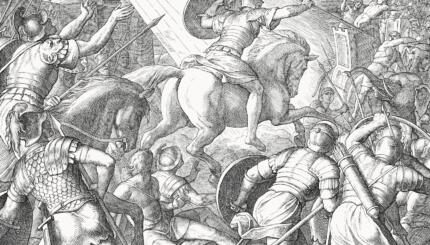“He was a tall man with broad shoulders, the type we used to call ‘a real goliath,’ powerful and with an unusual personality to boot. Unlike most of the Jews, he had no problem walking to his work, upright and with confidence. Instead of leading the line from the barracks, he insisted on bringing up the rear, and the whole way he would support the backs of those who had trouble walking. Avrum deh pusher (Avram the pusher), Avram deh Shtipper (Avram the booster), they used to call him in Yiddish. With his right hand, he picked up the weak, with his left he straightened the bent, and with his chest he pushed them forward. If he saw one of fellow Jews sway and fall, he would grab him quickly and give him a push so that the man could continue walking on his own. Everyone thought of him as a remarkable figure.”
This story is the eyewitness account of Rabbi Yisroel Meir Lau, former Chief Rabbi of Israel, and the youngest survivor of the Buchenwald Concentration Camp. It was he, like Judah the Macabbee in ancient time, who helped save lives in the camp with courage and love. During one of the darkest moments in Jewish history, Avram helped those along the way by instilling belief and hope that light can not only be found, but created, in the darkest of times.
When I light my menorah, I let the whole world know that sometimes I cannot see, and I really need you, my fellow-being, to show me the way, to lift me up, to push me forward and to encourage me to see the light at the end of the tunnel. The curse of exile and the dread of being lost and confused, “like a blind man,” leaves me not knowing where to go, how to live–even on a day with the clearest skies.
“Rabbi Yosee said: ‘All my life I was unable to understand the verse (Deuteronomy 28:29) that says: ‘And you will fumble in the afternoon just as a blind man gropes during in the darkness’ (he asks) why should it make a difference whether the blind walks in darkness or light?! But then this one time I was walking in the pitch black of night and darkness, and I saw a blind man, and he was walking on the way with a torch in his hand. I said to him ‘my son, this torch, what is its purpose for you?’ and the blind man responded ‘whenever I have this torch in my hand, other people can see me, and rescue me from the openings, thorns and lightning. Talmud: Tractate-Megillah 24b
The blind man engages in the seemingly unnecessary act of holding a candle in the dark, so the rest of the world could support him. At times we get caught up in our daily activities and our own misfortunes that I may pass someone who is holding a flame, and be so consumed, to never even see the menorah burning on the windowsill. As our sages tell us (Orach Chayim 672:1-2) that the time to light the menorah is when most people leave the market place to go home at the day’s end so that all can see the light permeating from your home.
In the words of Shlomo Carlebach, when we light the candles, I may be saying: “I don’t know where You are, but You better come get me.” We see a tremendous need today for light, but we must begin to realize, that if I don’t help my brother or sister stand, death would be imminent, if I don’t stop to appreciate the light in someone else’s home, then I’ll be afraid to admit that I sometimes am in need of light. Like Avrum deh shtipper, he lifted up those in need, because if he didn’t, no one else would.
menorah
Pronounced: muh-NOHR-uh, Origin: Hebrew, a lamp or candelabra, often used to refer to the Hanukkah menorah, or Hanukkiah.



